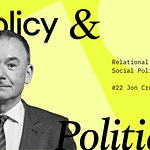In the last episode Gavin Jones, Chief Executive of Essex, reflected on his experience of and learning from working with Hilary Cottam, and the Family Life project, one of a series of experiments that paved the way to a more relational approach to public policy.
In this episode, my brother Geoff Little picks up the story. Initially I asked Geoff, as a former local authority Chief Executive, to reflect on what Gavin had to say in the round. Which he did. But it turned out Geoff was also heavily involved in similar work to Gavin and Hilary, about which he has a lot to say. Hence a full episode of reflection, not just a 10 minute postscript.
A lot of this episode is about the U.K Government’s Troubled Families Project. As Gavin said in his podcast, Eric Pickles the Government Minister responsible for Troubled Families -and Louise Casey the official responsible for national delivery- rejected Family Life as too expensive. Geoff describes a later similar Government rejection of the Manchester approach.
I realise having listened to the episodes that I don’t explain Troubled Families to the international or non policy listener.
After the Global economic crash, English government, national and local, focused on a small group of families with multiple problems. These families swallowed up disproportionate amounts of state funding. Individual services were no match for them.
Places like Swindon and Manchester sought to innovate.
Both places took a relational approach. The work rested on the relationship between a single worker and a family, a tonic for families used to seeing half a dozen agents of the state regularly knock on their door. It centred on relationships within the family, and with neighbours, often resolving years of conflict and disputes. The work focused on the potential of families more than their needs, on what Hilary Cottam -after Amartya Sen- would call their capabilities. One objective was to keep family members connected with the world, with school, with work, and with play.
The national programme has a mixed reputation. The language of ‘turning around families’ didn’t accord with the known complexities of family life, troubled or untroubled. The commissioning incentivised local authorities to tell the Government what they wanted to hear. Evaluations were pilloried in the media and there was an investigation by the Public Accounts Committee in Parliament.
But in Manchester, as Geoff describes in this episode, they took evaluation very seriously, and the results were extremely promising.
Writing this I can see how some readers and listeners might see this as an interesting but largely irrelevant side show. But I take some messages about the prospects of a relational social policy from these conversations.
First, there was a moral agent, Hilary Cottam, going against the grain long before anybody else was thinking about the problem let alone a different kind of solution.
Second, there were politicians and officials in Swindon, Manchester and other jurisdictions ready to take a risk on a novel and unproven approach.
Third, it is ideas that change the world. Hilary’s idea turned up in Manchester without her even visiting. Manchester applied, delivered and evaluated the idea differently, but the core was the same.
Fourth, effective policy demands precision. I have failed because the idea was wrong. Too often I have failed because the idea was lazily applied. In England, we are prone to lazy application of good ideas. Think population level public health. Think place. Think community power.
Fifth, the evaluation in Manchester was not designed to show success, it was designed to identify what didn’t work, and inform the correction of mistakes. And, thanks to the local government researcher Sarah Henry, backed by her policy and political bosses, it was done rigorously.
Sixth, the lasting learning and impact was designed and managed not at the centre of government, but by politicians and officials in local government who knew the people delivering and experiencing the policy change, and the places where they lived.
Interest in relational social policy appears to be growing again. If we are exploit its potential we have to learn from Hilary, Gavin, Geoff and others.
The how will be just as important as the what.















Share this post